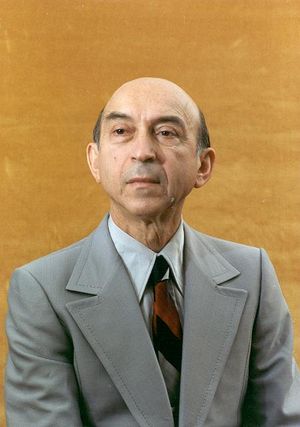Lotfi A. Zadeh
Biography
Lotfi A. Zadeh was born on 4 February 1921 in Baku, Azerbaijan. He studied at Alborz College, an American Presbyterian Missionary School in Teheran, Iran, and later at the University of Teheran, from which he received the B.S. degree in Electrical Engineering in 1942.
Dr. Zadeh traveled to the United States in 1944 to pursue graduate studies, and received the S.M. degree in Electrical Engineering from the Massachusetts Institute of Technology in 1946. Subsequently, he joined the faculty of Columbia University as an instructor in Electrical Engineering, where he earned the Ph.D. degree in 1949 and was appointed assistant professor in 1950. He was promoted to the rank of Professor in 1957.
In 1959, Dr. Zadeh left Columbia University to join the faculty of Electrical Engineering Department at the University of California, Berkeley. He was named Chairman of the department in 1963. During his five-year tenure as Chairman, the name of the department was changed to Electrical Engineering and Computer Science. Dr. Zadeh became Professor Emeritus in 1991 and continues to do teaching and research at Berkeley in his capacity as Director of the Berkeley Initiative in Soft Computing.
At Columbia University, Dr. Zadeh taught courses in electromagnetic theory, circuit analysis, system theory, information theory, and sequential machines. His doctoral dissertation initiated a new direction in frequency analysis of time-varying networks. In 1950, he co-authored, with Professor J. R. Ragazzini, a seminal paper on an extension of Wiener's theory of prediction. In 1952, he co-authored, also with Professor J. R. Ragazzini, a paper on sampled-data systems which led to the widely used method of z-transformation.
After moving to Berkeley, Dr. Zadeh focused his attention on linear systems and automata theory. This work led to his collaboration with Prof. Charles Desoer on a text on linear system theory entitled The State Space Approach, which laid the foundations for the modern approach to systems analysis and control.
In 1965, Dr. Zadeh authored his seminal paper on fuzzy sets. This landmark paper initiated a new direction which, over the past three decades, has led to a vast literature and a rapidly growing number of applications ranging from consumer products to subway trains and decision-support systems. In the future, the impact of fuzzy set theory-or fuzzy logic, as it is commonly referred to today-is likely to be felt not only in the realm of products and manufacturing, but also in the basic sciences, and especially in mathematics, physics and chemistry.
Dr. Zadeh is a Fellow of the IEEE and a recipient of the 1973 IEEE Education Medal, the 1992 IEEE Richard W. Hamming Medal, and an IEEE Centennial Medal. He is a member of the National Academy of Engineering and a Foreign Member of the Russian Academy of Natural Sciences. Among his other awards are the Ronda Prize, the American Society of Mechanical Engineers' Rudolf Oldenburger Medal, the Grigore Moisil Prize, the Kampe de Feriet Medal and several honorary doctorates. Dr. Zadeh is a fellow of American Association for the Advancement of Science, the Association for Computing Machinery, and the American Association for Artificial Intelligence. He was awarded the IEEE Medal of Honor in 1995 "For pioneering development of fuzzy logic and its many diverse applications."
Dr. Zadeh and his wife, Fay, reside in California. They have two children, Stella and Norman. His outside interests include photography and HI-FI.
